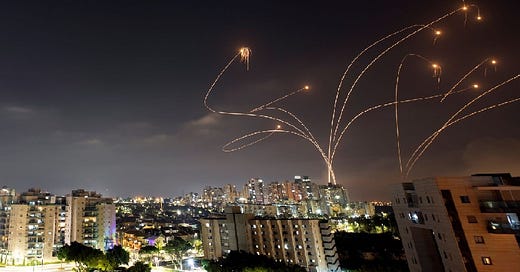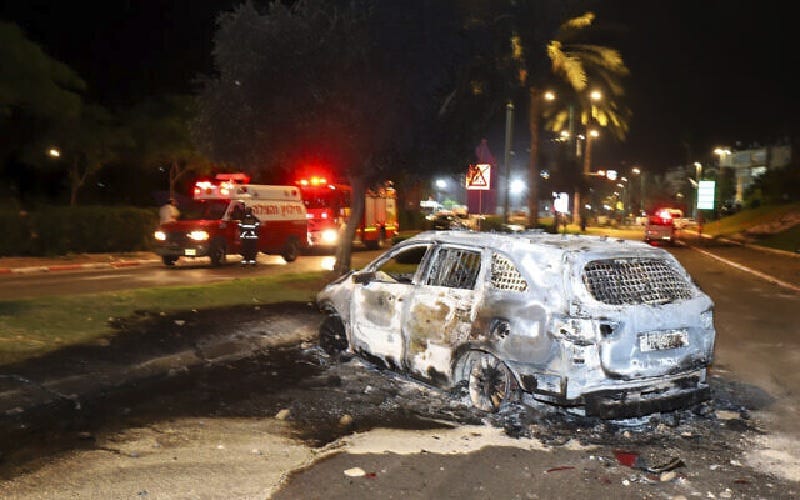Israel-Hamas conflict escalates as Biden cabal struggles to find a suitable narrative for it
Hamas acquisition of Iranian anti-tank missiles ups the ante against the Jewish state, but the terrorists may be setting the stage for tacit approval for Israel to destroy them
Hamas and Israeli missiles wheel around the skies over Jerusalem Wednesday evening as the Gaza terrorists continue their attack on the Israeli state. (Photo: Ezekiel Davat/Associated Press)
Missile attacks originating in the Gaza Strip just got personal for the Israeli military.
An anti-tank missile fired from the Gaza Strip on Wednesday killed a 21-year-old Israeli soldier — the first military death in the escalating Hamas violence on Israel.
The Israel Defense Forces identified the dead soldier as Staff Sgt. Omer Tabib, a member of the Nahal Infantry Brigade’s 931st Battalion, according to Israeli Defense Forces. The strike also wounded two other soldiers.
Tabib was killed Wednesday morning by an anti-tank missile launched by the Hamas terror group from Gaza at Israel, the IDF said in a statement, adding that one of the two soldiers who were injured is an officer. Gil Timor, the deputy mayor of the Hof Ashkelon region, also suffered a moderate shrapnel injury as he helped pull the other men from the vehicle. He and the wounded troops were taken to nearby hospitals in Ashkelon and Beersheba.
The military wing of Hamas had earlier announced it had targeted an Israeli military jeep across from northern Gaza with the Kornet guided-missile attack.
Gaza militants have launched more than 1,000 rockets since Monday, according to th IDF, which has carried out hundreds of airstrikes on Islamist groups in the crowded coastal enclave. Meanwhile, the Israeli security agency Shin Bet has identified the four top commanders in Hamas’ military leadership killed by the IDF in its coordinated strikes in Gaza City and Khan Younis.
Hamas confirmed the deaths of Bassem Issa, commander of Hamas’ Gaza City brigade, and his “brothers-in-arms” in an email response to inquiries by America’s Conservative Voice (ACV). Israeli Prime Minister Benjamin Netanyahu responded to an ACV request for comment late Wednesday, saying the Israeli response to Hamas terror is just a start.
“We eliminated senior Hamas commanders and this is just the beginning,” Netanyahu said. “We will inflict blows on them that they couldn’t even dream of.”
For his part, Joe Biden appears to be struggling to formulate a rational response to the Israel-Hamas conflict. It is obvious the lack of a cogent pro-Jewish reaction is frustrating to Israel following four years of President Donald Trump’s staunch support for the best ally the U.S. has in the Mideast. Trump offered military and financial backing to the Jewish state while upholding Israel’s right to exist and defend itself against terrorists.
That pro-Israel stance has served to undermine any effort by Biden to back off of it as such a reversal would be seen as an attack on Israel. In the past few days, the White Home and the State Department have claimed there are “critical considerations” about Israeli plans to evict over a hundred Palestinians from land they have squatted on in East Jerusalem in an attempt to force Jewish settlers out of that section of the city.
Palestinian protesters hurl stones at Israeli security forces amid clashes in Jerusalem's Old City on Saturday, 24 hours ahead of the barrage of missiles launched from Gaza. (Photo: Emmanuel Dunand/Associated Press
“As we previously stated, it’s vital to avoid steps that exacerbate tensions or take us farther away from peace,” State Department spokeswoman Jalina Porter said last week. “That includes evictions in East Jerusalem, settlement approval, dwelling demolitions and acts of terrorism.”
On Wednesday, Hamas continued to escalate tensions, launching regular volleys of rockets into Israel, some targeting Tel Aviv, a northern cosmopolitan area that has previously been left unsoiled by Hamas missile attacks. Israel stepped up its defensive response in the Gaza Strip with continued airstrikes. The White House said late Wednesday that U.S. Secretary of State Antony J. Blinken telephoned Gabi Ashkenazi, his Israeli counterpart, to discuss a de-escalation.
The Biden administration’s public language has remained pathetically weak, not addressing Israel’s sovereignty in the meekest of terms. Still, Palestinians complain the Biden cabal has not said anything against what they claim was excessive force initiated by Israeli police firing on the al-Aqsa Mosque, the third holiest website in Islam, during Ramadan prayers last week and over the weekend. Israel additionally restricted Palestinian entry to the hilltop website, further inflaming tensions.
Trump providing political support to Israel, according to Hamas, helped emboldened Israel in its plans to settle parts of the West Bank. Muslims view that portion of Israel as a future Palestinian state co-existing with Israel inside ancient territory. Israel has allowed a large number of Israelis to settle in that area, chopping the territory into largely disconnected enclaves separated by massive security walls
By such open settlement, Israel seeks to protect the entire territory, which encompasses most of the land from the Mediterranean into western Iraq the Jewish people believe God gave them thousands of years ago.
In response, the military arm of Hamas apparently is trying to wipe Israel from the face of the Earth. In addition to the four-day missile attack continuing to this hour, intense Arab rioting broke out in the central Israeli city of Lod late Tuesday. Three synagogues and numerous shops were reportedly set on fire, along with dozens of cars.
Some residents reported power was cut in their homes and Molotov cocktails were thrown through their windows. Local Israeli police acknowledged having to escort some residents from a community center to their homes as Arab mobs marauded in the streets. One man was seriously hurt when hit by a concrete block in his car, and was hospitalized. Another local resident was seriously hurt.
After Mayor Yair Revivo of Lod appealed directly to the prime minister for urgent help, a state of emergency was declared in the city for the first time since the 1967 War, and a large force of Border Police were deployed to work to restore order.
With Hamas missiles acquired from Iran raining down on Israel, Palestinian rioters burned vehicles and killed at least two Israelis Wednesday. (Photo: Yossi Aloni/Flash90)
“Prime Minister [Benjamin] Netanyahu directed that lawbreakers be dealt with severely and that units on the ground be reinforced in order to restore quiet and order to the city forthwith,” IDF Col. Zedekiah Cohen told ACV.
The scale of the latest Gaza missile launches suggests the Israeli military and intelligence services have been caught napping. During the 2014 Gaza war, rockets out of the coastal enclave during the entire 50-day conflict numbered approximately 4,000, with the highest daily number about 200.
At present, rockets from Gaza are daily numbering over a thousand, including two occasions when more than 100 rockets were fired in a handful of minutes.
What seems clear is that since 2014 – the last major conflict in Gaza – Hamas and the other armed groups in the coastal enclave have quietly rebuilt their missile arsenals on a larger scale than had been understood.
Last year, in an unusual move, Hamas shared details of its weapons acquisition on an al-Jazeera news broadcast in which the main purpose appeared to be to demonstrate how efforts by Israel and Egypt, on Gaza’s southern border, had not prevented it from rebuilding its arsenals, obviously with help from Syria and Iran. It is a boast, however, that may come back to haunt Hamas and Islamic Jihad.
The relative success of its recent tactics — from Hamas’s point of view — have the appearance of being long in preparation. That represents a clear challenge to the Israeli political and security establishments to deal with a threat made suddenly very real.
While the Israeli military has been bombing launch sites, including heavy missile and artillery attacks in northern Gaza, and targeting key figures, such efforts in the past have been with mixed effect. These tactics have typically been followed by Israeli large-scale ground incursions into the West Bank and Gaza. Past efforts have always stuttered to a halt in the face of growing international outrage and attempts at mediation.
Significant this time, perhaps, is that among the other weapons acquired by Hamas have been supplies of highly accurate Kornet anti-tank missiles, the same system that was used with much effect by Hezbollah against Israeli tanks in the second Lebanon war in 2006.
One of these missiles was used on Sunday to target an Israeli car close to the Gaza border. A second was fired early on Wednesday at a civilian 4X4 vehicle, killing one occupant and seriously injuring two others. It delivered a clear message about what Israeli troops entering Gaza might face.
All of which contributes to a highly dangerous dynamic in which, even if Hamas wanted to negotiate an end to the violence as some — including Ismail Haniyeh, the head of Hamas’s political bureau — are suggesting, political pressure in Israel could work against it.
Given the current threat to Israel, the Jewish state would be far better off brushing aside U.S. and international criticism and putting an end to Hamas terrorism once and for all. Whatever happens with Iran, the terrorists’ biggest supporters, will be then be on Iran.







